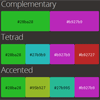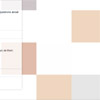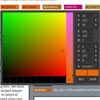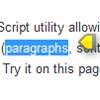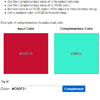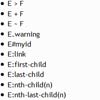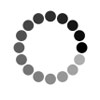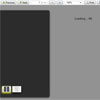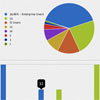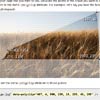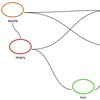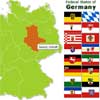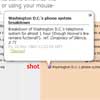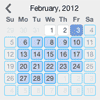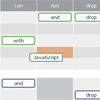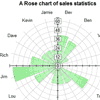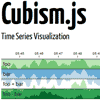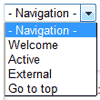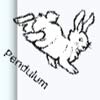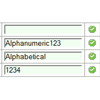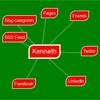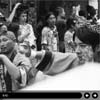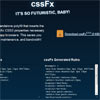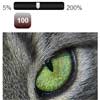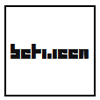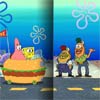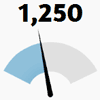colz
Colz. Javascript library to convert colors between RGB / Hex / HSL / HSV / HSB color spaces. It provides several toString helpers to ease its use in CSS / HTML5 Canvas projects.
Also provides some helpers to create "color schemes" or "color palettes".
Usage
You can create a color initializing the object with an Hex, or an RGB / RGBa value this way:
color1 = new colz.Color('#f26c4f'); color2 = new colz.Color('#f00'); // Short Hex color3 = new colz.Color(0, 114, 188); // Rgb color4 = new colz.Color(0, 114, 188, 0.1); // Rgba // You can pass Rgb in array format too color5 = new colz.Color([0, 114, 188]); // Rgb color6 = new colz.Color([0, 114, 188, 0.1]); // Rgba Once initialized you can get the color in several formats accesing the object's properties.
color1.hex // #f26c4f color1.rgb // {r: 242, g: 108, b: 79} color1.rgba // {r: 242, g: 108, b: 79, a: 1} color1.hsl // {h: 11, s: 86, l: 63} color1.hsla // {h: 11, s: 86, l: 63, a: 1} // Also its individual componets color1.r // 242 color1.g // 108 color1.b // 79 color1.h // 11 Provides four private methods to update your color HSLa settings that automatically update all the colorspaces values.
color1.setHue(206); // Update Hue color1.setLum(86); // Update Luminosity color1.setSat(35); // Update Saturation color1.setAlpha(0.88); // Update alpha You can get a random color using
c1 = colz.randomColor(); // Return colz.Color object Any of the colorspaces have an "toString" method to ease its usage in CSS / HTML5 Canvas projects.
color1.rgb.toString(); // "rgb(0,114,188)" color1.rgba.toString(); // "rgba(0,114,188,0.88)" color1.hsl.toString(); // "hsl(204,100%,37%)" color1.hsla.toString(); // "hsla(204,100%,37%,0.88)" And two public methods to convert HSB Colors (the color-space used in Adobe applications like Photoshop) to RGB of HSL.
colz.hsbToRgb(204, 100, 74); // [249, 132, 14] colz.hsbToHsl(204, 100, 74); // [204, 100, 37] Color Schemes / Paletes
Color Schemes are colz.Color collections so you can handle all the colors you are using in a project in a single object, easier to iterate and to work with. Think about it as a a 'palette' where you store all your colors.
To create a custom color scheme / palette is as simple as passing an array of colors to the constructor:
myColors = new colz.ColorScheme(['#ffff0','#fb0102']); // You can also pass RGB color arrays myColors = new colz.ColorScheme([[255, 01, 03], [254, 12, 23]]); // Access your palette with myColors.palette[i] Another way is to pass a single color and an array of HUE shifts. So if you want to get 2 aditional colors with their HUEs "rotated" 120º (usually called "Triad Complementary colors") you can do it this way:
// Creating a "triad" myPalette = new colz.ColorScheme('#f00', [120, 240]); To ease the generation of complementary colors ColorScheme provides some "shortcut" constructors.
// Complementary color (HUE + 180º) myColors = new colz.ColorScheme.Compl(base_color)); // Triad (HUE + 120º, HUE + 240º) myColors = new colz.ColorScheme.Triad(base_color)); // Tetrad / quad (HUE +60º, +180º, +240º) myColors = new colz.ColorScheme.Tetrad(base_color)); // Analogous (-45º, +45º) myColors = new colz.ColorScheme.Analog(base_color)); // Accent analogous (-45º, +45, +180º) myColors = new colz.ColorScheme.Accent(base_color)); // Split complementary (+150º, +210º) myColors = new colz.ColorScheme.Split(base_color)); // Custom degrees myColors = new colz.ColorScheme(base_color, [50,60,80])); Take a look to the colz.test.js to see some working samples.
Projects using colz.js
Ports to other languages
Updates
- 2014 / 06 / 03 Ie6/7 bug fixed. Thanks to aiyuchen
- 2014 / 06 / 03 Bad calculation with hsv (v == 0) bug fixed. Thanks to aiyuchen
- 2015 / 06 / 12 Added "rebeccapurple" color to RGB.to http://rgb.to/rebeccapurple . Thanks to davidhund
